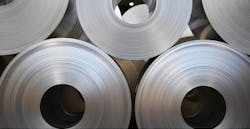Corporate America Makes Its Case That Trump Tariffs Don’t Apply
Across corporate America, the race is on to dodge the tariff.
Just as President Donald Trump left the door open for countries to apply for exemptions to the 25% levy on steel and 10% on aluminum, his official proclamations Thursday also offer some workarounds for companies.
Under the new rules, an importer can ask the Commerce Department for a waiver if there’s a limited supply of the product in the U.S. or if national security is at stake. How that’ll be interpreted is anyone’s guess, but aluminum can makers, pipeline builders and car companies are now building their cases for why the tariffs shouldn’t apply to them.
“The can industry relies on imported metal to make up for shortfalls of domestic steel and aluminum production. U.S. steel producers are unable to satisfy domestic demand for food, aerosol and other can production,” the Can Manufacturers Institute said Thursday. The group will apply for exemptions for aluminum can sheets, aluminum ingots and steel tinplate -- the material many food cans are made of.
In a surprise move, Trump excluded Mexico and Canada from the tariffs in his announcement Thursday, allowing for the possibility that other countries could be spared for national security reasons. The tariffs will take effect in 15 days.
The trade group that represents General Motors Co., Ford Motor Co. and Fiat Chrysler Automobiles NV hinted that automakers -- which purchase about 15% of the steel and almost 40% of aluminum consumed in the U.S. -- will press the Trump administration to water down the order by carving out exceptions for imports from some countries.
“The temporary exemption for our trading partners in Canada and Mexico is a step in the right direction,” said Matt Blunt, president of the American Automotive Policy Council. “We fully understand the desire to take action against nations whose unfair trade practices have led to global overcapacities in steel and aluminum, and encourage the administration to adopt a targeted approach.”
The Center for LNG, a liquefied natural gas industry group, plans to seek an exemption because some of the five kinds of steels it uses aren’t available from U.S. sources. For example, steel used for cryogenic tanks, where fuel is stored after it’s been chilled to minus 260 degrees Fahrenheit (minus 162 Celsius), is hard to come by domestically, Daphne Magnuson, a spokeswoman for the group, said Thursday.
Andy Black, president of the Association of Oil Pipe Lines, said in an interview Monday that pipeline developers would be seeking exemptions for when they can’t get sufficient materials sourced domestically. “That’s what pipeline operators feel like they need to keep a period of buildout going, so projects aren’t delayed or canceled because of cost,” he said.
Pipeline builders argue that many U.S. steel mills haven’t invested in producing the kind of specialized pipe that is needed to meet industry standards for integrity and strength, making it usable in oil and gas pipelines. Fewer still produce large pipe with very thick walls -- the kind used in long-distance projects.
The oil and gas industry’s success in boosting production has reduced the perception of energy security risk in Washington, which may make it difficult for oil companies to win exemptions to the tariffs, according to Kevin Book, managing director of Clearview Energy Partners LLC. The Trump administration may be reluctant to grant too many exceptions because it would have to raise tariffs on other countries to make up the difference, Book said in a note Thursday.
“We will work with the administration for maximum flexibility and consideration in how today’s proclamation is applied to minimize the impacts to U.S. investment in infrastructure, energy development, and building new facilities for America’s future,” Jack Gerard, president of the American Petroleum Institute, said in an emailed statement.
Greg Armstrong, CEO of Plains All American Pipeline LP, told audience members at a Houston conference on Monday that he couldn’t buy one type of 26-inch (66-centimeter) pipe he needs for a specific project because it’s only made in three places -- and none of them are in the U.S.
Plains is building two pipelines right now to bring oil from the booming Permian shale basin, Armstrong said. One would go to Corpus Christi, Texas, and the other to a major storage hub at Cushing, Oklahoma. The two projects will add about 750,000 barrels a day of capacity to move oil and will help send shale production to overseas buyers.
“We’ve got about $1.5 billion of projects under way right now that use quite a bit of steel, so we were trying to figure out how bad that hurts, depending on where we made orders,” he said.
By Jennifer Kaplan and Naureen S. Malik
About the Author
Bloomberg
Licensed content from Bloomberg, copyright 2016.
